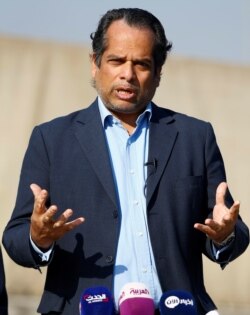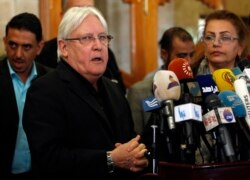The World Health Organization will start shutting down some of its programs in Yemen due to funding shortages, just as the coronavirus is starting to spread in the war-torn country.
“Amidst a pandemic, this is shocking,” U.N. acting deputy humanitarian chief Ramesh Rajasingham said Thursday. “Preventing disease and feeding sick children are the kinds of programs that everyone agrees should be protected at all costs.”
He said 31 of 41 major U.N. programs would start closing down in the next few weeks if funding does not quickly arrive.
“That means many more people are likely to die,” he told a virtual meeting of the U.N. Security Council.
The development comes as Yemen’s confirmed cases of COVID-19, the disease caused by the coronavirus, are starting to rise. The country has recorded 72 cases and 13 deaths. Yemen confirmed its first case on April 10, but 62 of the infections were reported in just the last ten days, indicating community transmission.
Half of all medical facilities in the country are not functioning and a large coronavirus outbreak could be devastating for a population already weakened by the effects of five years of war.
Despite shortfalls, the U.N. has done what it can to prepare the country for COVID-19. Rajasingham said 38 hospitals are being prepared to handle virus cases. Health workers are being trained and essential supplies delivered — including ventilators, tests and personal protective equipment. But recently established Rapid Response Teams for the virus will have to shut down next month.
More than five years of conflict between the Saudi-backed government and Iranian-supported Houthi rebels have deepened Yemen’s poverty, devastated its infrastructure and caused widespread hunger and suffering.
Humanitarians and diplomats agree that the best way to contain the virus is to stop the fighting.
Security Council members on Thursday urged both sides to quickly agree to a nationwide cease-fire put forward by U.N. envoy Martin Griffiths as the best way to end suffering and contain COVID-19.
“The United Nations has provided a feasible roadmap,” Griffiths told council members. “It is up to those with arms and power to make the decisions to achieve it.”
He said the cease-fire is part of the broader package that needs to be fully agreed to, but there are some differences on parts of the humanitarian and economic measures. Griffiths said they are not new issues and are necessary and overdue, and could help with containing the virus.
“Parties should be able to agree on how to move forward with them quickly,” he said.
On June 6, Saudi Arabia will host a virtual donor conference for Yemen. Aid agencies have estimated they will need $2 billion to cover programs through the end of this year.






